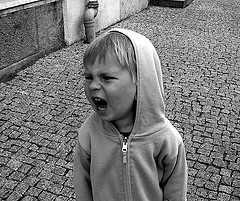 Let’s face it. You try to be a good, patient parent, but there comes a time (usually called “day time” or “night time”) when your kids drive you insane, and you can’t make sense of why they treat you the way they do, when you’re only trying to be nice to them.
Let’s face it. You try to be a good, patient parent, but there comes a time (usually called “day time” or “night time”) when your kids drive you insane, and you can’t make sense of why they treat you the way they do, when you’re only trying to be nice to them.
You try to control their behavior (so they wouldn’t be so annoying and can grow up to be responsible adults), but that never seems to work. They’re committed to testing your patience, and usually succeed in seeing you crack.
So why are kids so damn annoying, and what can you do, as a parent, to correct this?
Luckily for you, I have 2 tips to help you “deal” with your pesky children:
1) Your kids aren’t the problem:
When it comes to parenting, and almost any situation in life where your patience is tested, it’s not the situation that’s the problem, but your fear that you won’t be able to handle the situation effectively.
You’re afraid of making a mistake. You’re afraid of not knowing what to do, or not having enough personal strength and resilience to manage yourself in that situation. You feel that you’ll be judged by others for not being a good parent (or a good human being).
At times you’re struggling with another issue that’s making you feel anxious and worried, and your children aren’t giving you enough space to think your problem through, so you see them as the problem, without realizing that you’re only taking out your frustration at them.
But because your children aren’t to blame, there’s no reason to take your frustration out at them.
Be aware of the issues that annoy you, and look for ways to deal with these issues, rather than suppress your feelings about them.
Don’t be harsh on yourself, or harsh on your children.
2) Your kids are kids:
We tend to feel frustrated when we want things to be different than what they are. We expect a dial-up Internet connection to behave like a broadband line, and get frustrated when our expectations aren’t met. We snap when we drop a glass vase and it shatters into a million pieces because we don’t want a glass vase to break. We fume when our children don’t behave the way we want them to, because we expect them to behave like mature adults, and not as children.
But kids are kids, and will behave as kids. They’re not fully mature, so they don’t know how to handle every situation effectively, and don’t have proper control over their emotions, or a sound understanding of how the world (and social customs) work. How many adults do you know that act maturely in every situation? So why do we expect children to behave impeccably?
It’s important to treat children as children, and not to take any shortcuts in their upbringing by condemning them for not behaving as adults, or expecting them to follow our instructions, without giving them room to think for themselves.
It’s wonderful to see children behave as children (which is not always apparent, given other life challenges we face!), and the natural phase of human development they’re going through. How they discover things for the first time. How they try to voice their opinions and express their feelings. How they meet new challenges: what they have the courage to face, and what they’re too afraid to confront. How they try to mimic your behavior and what expressions they learn to use. How they develop their likes and dislikes.
Whenever you find yourself getting annoyed by your children, remember that they are children, and you shouldn’t be expecting any more from them than they are able to do at this part of their development.
See the world through their eyes, and you might appreciate what they’re going through. 🙂
Photo credit: mindaugasdanys
